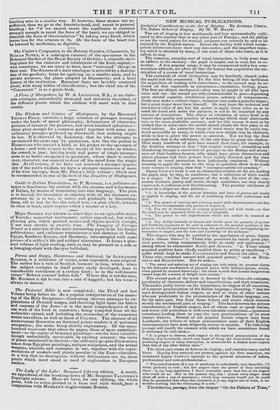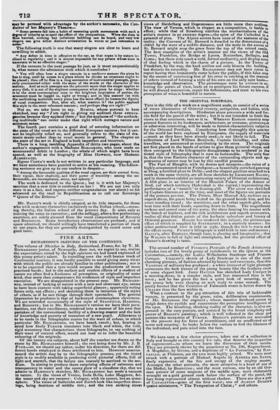NEW MUSICAL PUBLICATIONS.
Analytical Consideratims on the Art of Singing. By ANDREA COSTA. The Italian School of Singing. By M. W. BALPE.
The art of singing is less assiduously and less systematically culd.,
vated in this country than in any other part of Europe ; and the ability to use the vocal organs for musical purposes can scarcely be said to be enjoyed by the English nation. Hence the facility with which incom- petent instructors force their way into notice, and the imperfect train- ing which is obtained by many, if not most of those who learn, as it is called, to sing.
The common, everyday sort of vocal instruction, is little more than
an address to the memory : the pupil is taught, not to read, but to re- member. A few popular songs, it may be ornamented with a few corn- monplace addenda, are often all that the learner has acquired at the ter- mination of a course of vocal instruction.
The essentials of vocal instruction may be familiarly classed under the useful and the ornamental. To the first belong all that facilitates the acquisition of reading with correctness ; to the second may be re- ferred all that superadds to correctness—expression, feeling, grace. The first are almost mechanical—they may be taught to all who have voice and ear: the second are only communicable in part--depending upon mental capacity, intellectual power, ardency of temperament. Study may make a correct singer, imitation may make a graceful singer; but a great singer must form himself. He may learn the technical and mechanical rules of art, but the power to apply those rules so as to reach the heart and move the passions is not to be imparted by any process of instruction. The object of education of every kind is to impart that quality and quantity of knowledge which shall afterwards turn to the most profitable account ; and for this reason it were to be wished that in most cases the useful should obtain the first place in all vocal tuition. An extensive range of vocal music may be easily ren- dered accessible to many, in which even new delight may be obtained, while to few is given the power to astonish. Yet we find the first neglected, that is the substance, in the vain hope to grasp the shadow. How many hundreds of girls have wasted their time, for example, in the fruitless attempt to sing " Son vergine vezzosa," scrambling and blundering through a succession of passages to the dismay and annoy- ance of their luckless hearers, who might have given themselves and others pleasure had their powers been rightly directed, and the time devoted to vocal instruction been judiciously employed. Without meaning to apply the term to the song in question, there is no truth more certain in singing, than that " corruptiooptimi est pessima." Signor COSTA'S work is not an elementary treatise on the art, leading the pupil, step by step, to excellence, but a collection of hints useful to a singer. In the first portion of the work, his view of the con- nexion between poetry and music, though sometimes not very clearly expressed, is judicious and discriminating. The peculiar attributes of genius in a singer are thus defined— "I. A knowledge of the precise intention and force of poetry and music as applied to singing, and the art of combining them with correctness and skill.
"2. The power of varying and adorning music with discrimination and fine taste, where ciicumstances may permit or 'empire it. "3. The art of declaiming in singing gracefully and with truth—so that the mind may be impressed while the ear is delighted. "4. The power to veil imperfections which can neither be removed or omitted.
"5. The ability instantly to discern and decide upon the quantity of power and flexibility necessary to be used in reference to the peculiar qualities of the place in which the performer has to sing, the peculiarities of accompanying in- struments or singers, and the taste and knowledge of the audience."
The singers who may be entitled to the appellation of great, Signor COSTA classes thus-4.1. Those who possessed by nature great phy- sical powers, owing comparatively little to study and cultivation : among whom he enumerates BANTI and ANZANI. "2. Those whose acquired qualities have chiefly enabled them to arrive at excellence : " under which head he ranks PACCHIAROTTI and DAVID the elder. "3. Those who combined natural with acquired power;" such as RUB/. NELLI and BILLINGTON. But be adds- " The sweet and seducing art of singing can only attain its greatest charm by the fortunate combination of physical power with brilliant genius, which, when guided by musical knowledge, the result is such that human imagination cannot hope for a source of delight more intense."
The second part of the work is devoted to the voice—its compass, peculiarity of character, defects and imperfections, and their treatment. The author justly insists on the importance, to singers of all countries, of a correct pronunciation of the Italian language; observing, "that the most distinguished Italian singers, as well as those of other nations who are proficients in the pronunciation of the Italian language, are, for the most part, free from those defects and errors which concern merely the mechanical part of singing." This fact deserves the serious consideration of English singers, few of whom read or speak Italian, and fewer still pronounce it with even tolerable correctness,—ignorance sometimes leading them to copy the very provincialisms of its more impure dialects. Several of our popular Italian singers have been Lombards, the defects of whose pronunciation some of their English contemporaries have most diligently striven to acquire. The following passage will justify the censure with which we have sometimes found it necessary to visit such- " It is proper to observe, with respect to the musical pronunciation of the Italians, that Lombardy, which may boast of being the most fertile country in producing singers of every description, is notorious for a dialect more impure than that of any other Italian state."
The third part treats of defects in singing ; and contains many useful hints. Having first entered our protest against his first assertion, we commend Signor COSTA'S opinion to the general attention of ladies, professional and non-professional- " The embellishment of a run of semitones is undoubtedly very beautiful, (?) when perfectly in tune ; but few singers have the power of thus executing them in my long experience I don't remember more than five or six singers who could do so. But in the present day, alas ! almost every singer must show off with a run of semitones ; which they ceitainly would not do could they be persuaded that when this ornament is in any degree out of tune, it re- sembles nothing but the whinnying of a colt."
The following passage, from the chapter "On the Defects of Time,"
stay be perused with advantage by the author's namesake, She Con- doctor of her Majesty's Theatre-
" Some persons fall into a habit of exeseiting quick movements with such a degree of velocity as to spoil the effect of the composition. Whet' the tirne is Iliac harried, nothing bat indistinct babbling Can be heard, and very few singers can give either distinct artiedation to words or just intonation to mass."
The following truth is one that many singers are slow to learn and unwilling to admit.
44 Any defect in time is offensive to the ear, as that organ is by nature ic. dined to regularity ; and it is !almost impossible for any person whose time is uncertain to be an effective singer."
If the censure in the next passage be just, as it most unquestionably is, what means the admission with which it concludes ?
" You will often bear a singer execute in a mediocre manner the piece he ltaa to sing, until he comes to a place where he thinks an ornament ought to be placed; then off he flies in a long succession of instrumental passages, gene- rally unconnected either with the sense of the words or the character of the melody. And as such passages are the piccnnte sauce that the singer applies to every dish, it is not of the slightest consequence what piece he sings : whether It be the most commonplace tune or the brightest inspiration of genius, tile ornament must be lugged in, tight or wrong ; and in this manner (as with the unthinking multitude every piece has the same effect) he lessens the dignity of vocal composition. But, after all, what matters it? the public applaud this style in the most vehement manner ; and perhaps they are right I " Not so, we take leave to say. RUBINI, whose portrait is here sketched, may say "lam right in giving my auditors these extrava. pncies because they applaud them ;" but the applause of "the unthink- ing multitude" can never make that right which outrages nature and sommon sense.
The fourth part contains a good deal of amusing information on She state of the vocal art in the different European nations ; but it can. Rot be implicitly relied on, and generally refers to the state of dra. matic music rather than to vocal music in general. The chapter on the state of the art in England is both imperfect and incorrect. There is a long, rambling Appendix of thirty-two pages, about the author's engagement with a Madame BORGONDIO, who once made an unsuccessful debut in London ; the whole of which might have been spared, as well as the biography of Miss Howsou, now Madame ,ALBERTAZZI.
Signor COSTA'S work is not written in any particular language, and we have sometimes been puzzled to arrive at his meaning. The follow- ing sentence we give up to our readers in despair- " Among the favourable qualities of the vocal organs, are their normal form, their vigour, their elasticity, and their power of tractility: among the un. favourable, are incompliance, stony, and aphony."
The work is dedicated to the Queen ; but is it with her Majesty's Sanction that a new title is conferred on her ? We are not (we only state it as a fact, and express neither congratulation nor alarm) so far advanced on the road to Republicanism as to call our Sovereign
• 4 Queen of the Britons."



























 Previous page
Previous page